
Raka Ray
I am a sociologist with interests in gender and feminist theory, postcolonial sociology and the emerging middle classes. My site of research is India. My interest in gender is fundamental to my work as a scholar, even as how I study gender has continually evolved. Here’s a brief description of my areas of work:
Social Movements: My first book, Fields of Protest, argued that the differences in the women’s movements of two Indian cities (Kolkata and Mumbai) could be attributed to the shape of their political fields, and argued that the success or failure of politically affiliated and autonomous women’s groups depended on the political fields within which they were located. Social Movements in India (co-edited with Mary Katzenstein) shows the differences between social movements formed in the crucible of Nehruvian and post-Nehruvian India.
Reproduction of Inequality: In Cultures of Servitude (co-authored with Seemin Qayum), we examined how class and gendered inequality gets produced and reproduced on a daily basis within the private world of the household. A co-edited book with Amita Baviskar, Elite and Everyman: The Cultural Politics of the Indian Middle Classes questions the expected link between the growth of the middle classes and democracy in the Indian context, suggesting that the cultural dominance of the middle class has effectively undermined and even subverted the democratic possibilities inherent in Indian politics.
Postcolonial Sociology: Several essays explore the possibilities of a Postcolonial Sociology, both in terms of the substance of Postcolonial theory – a consideration of the constitutive effects of colonial rule on colonizer and colonized ‐‐and in terms of the challenges to the epistemological foundations of the field of Sociology. A special issue of Political Power and Social Theory (co-edited with Ann Orloff and Evren Savci) highlights how the absence of postcolonial reflexivity might lead to perverse gender politics.
Gender, Class and Neoliberalism: My current project, set in the cities of Mumbai, Allahabad and Siliguri, investigates new meanings of middle-classness, gender and mobility against a neoliberal economy and the valorization of the culture of aspiration.
Pedagogy: The Handbook of Gender showcases classic and contemporary approaches to the study of gender in India in fields ranging from law to politics and from sexuality to religion. The Social Life of Gender (Sage 2018), co-written with former students (Particularly Jennifer Carlson and Abigail Andrews), is a new, global approach to teaching the Sociology of Gender in the US.
Books
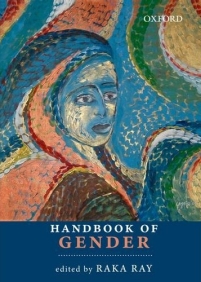 Ray, Raka. 2012. (ed.) Handbook of Gender. Delhi: Oxford University Press.
Ray, Raka. 2012. (ed.) Handbook of Gender. Delhi: Oxford University Press.
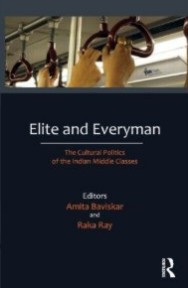 Baviskar, Amita and Ray, Raka. 2011. (eds.) Elite and Everyman: The Cultural Politics of the Indian Middle Classes. Routledge
Baviskar, Amita and Ray, Raka. 2011. (eds.) Elite and Everyman: The Cultural Politics of the Indian Middle Classes. Routledge
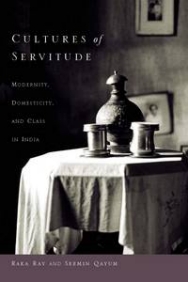 Ray, Raka and Qayum, Seemin. 2009. Cultures of Servitude: Modernity, Domesticity and Class in India. Palo Alto: Stanford University Press (in India, Oxford University Press, 2010)
Ray, Raka and Qayum, Seemin. 2009. Cultures of Servitude: Modernity, Domesticity and Class in India. Palo Alto: Stanford University Press (in India, Oxford University Press, 2010)
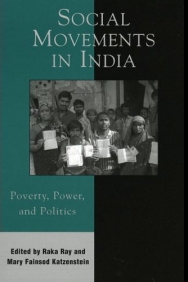 Ray, Raka and Katzenstein, Mary and. 2005. (eds.) Social Movements in India: Poverty, Power, and Politics. Rowman and Littlefeld (Published in India by Oxford University Press)
Ray, Raka and Katzenstein, Mary and. 2005. (eds.) Social Movements in India: Poverty, Power, and Politics. Rowman and Littlefeld (Published in India by Oxford University Press)
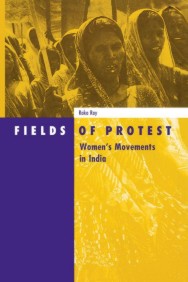 Ray, Raka. 1999. Fields of Protest: Women’s Movements in India. Minneapolis: University of Minnesota Press.
Ray, Raka. 1999. Fields of Protest: Women’s Movements in India. Minneapolis: University of Minnesota Press.
- Published in India by Kali for Women, 2000
- excerpted in Louise Edwards and Mina Roces (eds) Women in Asia, Vol. 1: Women and Political Power. London and New York: Routledge, 2009)
Articles
Ray, Raka. 2021. "The politics of masculinity in the absence of work." https://doi.org/10.1080/13600818.2021.1996556 Oxford Development Studies.
Baviskar, Amita and Ray, Raka. 2021. "Covid-19 at Home: Gender, Class and the Domestic Economy in India." Feminist Studies 46:3
Ray, Raka. 2021. "Resentment and Revenge: Internal Colonialism, the Decline of Fordism and the Trump Vote," in Osagie Obasogie (ed) Trumpism and its Discontents. Berkeley Public Policy Press, University of California, Berkeley.
Orloff, Ann, Ray, Raka and Savci, Evren. 2016. Introduction, “Perverse Politics? Feminism, Anti-Imperialism, Multiplicity” Political Power and Social Theory 30
Ray, Raka. 2013. "Connell and Postcolonial Sociology" in Political Power and Social Theory 25
Ray, Raka. 2012. “The Everyday Embrace of Inequality” The Hindu, Feb 2.
Ray, Raka. 2011. “The Politics of Knowledge: The Women’s Movement and Gender Scholarship in India” in Raka Ray (ed.) Handbook on Gender (Oxford University Press, India)
Baviskar, Amita and Ray, Raka. 2011. “Introduction” in Amita Baviskar and Raka Ray (eds) Elite and Everyman: The Cultural Politics of the Indian Middle Classes. Routledge,
Qayum, Seemin Qayum and Ray, Raka. 2011. “The Middle Classes at Home” in Amita Baviskar and Raka Ray (eds) Both Elite and Everyman: The Cultural Politics of the Indian Middle Classes (Routledge)
Ray, Raka. 2011. “The Middle Class”: Sociological Category or Proper Noun?” Political Power and Social Theory 21
Qayum, Seemin and Ray, Raka, 2010. “Male Servants and the Failure of Patriarchy in Kolkata (Calcutta)” Men and Masculinities October 2010 13: 111-125
Qayum, Seemin and Ray, Raka, 2010. “Traveling Cultures of Servitude: Loyalty and Betrayal in New York and Kolkata” in Eleen Boris and Rhacel Parrenas (eds) Intimate Labors: Care, Domestic and Sex Work (Stanford University Press.)
Ray, Raka and Radhakrishnan, Smitha. 2010. “The Subaltern, the Postcolonial, and Cultural Sociology” in John Hall, Laura Grindstaff, and Ming-Cheng Lo (eds.) Handbook of Cultural Sociology (Routledge, 2010)
Ray, Raka. 2006 “Is the Revolution Missing or Are We Looking in the Wrong Places?” Social Problems, November.
Ray, Raka. 2006. “A Slap from the Hindu Nation” in Amrita Basu and Srirupa Roy (eds) Violence, Modernity and Democracy in India, Berg Press (Calcutta: Seagull India Press).
Ray, Raka and Katzenstein, Mary. 2005. “And in the Beginning there was the Nehruvian State” in
Raka Ray and Mary Katzenstein (eds.), Social Movements in India: Poverty, Power, and Politics. Rowman and Littlefeld.
Ray, Raka. 2004. “Feminist Theory: Two Decades After the Missing Revolution” in Perspectives 27(3)
Qayum Seemin and Ray, Raka. 2003. “Grappling with Modernity: Calcutta’s Respectable Classes and the Culture of Domestic Servitude” Ethnography 4:4 (reprinted in Open Times 1: 2004, Beijing, China)
Ray, Raka. 2003. “On Engendering A Better Life” John Foran, Kumkum Bhavnani and Priya Kurien (eds) Feminist Futures: Re-Imagining Women, Culture and Development. Zed Press
Ray, Raka. 2002. “Where Women Bore the Brunt” The Hindu, May 11.
Ray, Raka. 2001. “The Burden of History: Women’s Movements in the Third World” for "Geschlechterverhaeltnisse und soziale Bewegungen" (Gender and Social Movements) of the Forschungsjournal Neue Soziale Bewegungen 2, June.
Ray, Raka. 2000. “Masculinity, Femininity And Servitude: Domestic Workers in Calcutta in the Late Twentieth Century” Feminist Studies 26(3)
Ray, Raka. 1999. “Women’s Movements in the Third World: Identity, Mobilization and Autonomy” with Anna C. Korteweg, for Annual Review of Sociology 25:47-71.
Ray, Raka. 1998. “Women’s Movements and Political Fields: A Comparison of Two Indian Cities” Social Problems 45 (1).
Ray, Raka. 1998. “Revisiting the Indian Sociology Debates: A Sociology for India versus a Sociology of India” Center for South Asian Studies Working Papers Series.
Ray, Raka 1995. “Conformity and Rebellion: Girls' Schools in Calcutta” in Bharati Ray (ed.) From the Seams of History: Essays on Indian Women. New Delhi: Oxford University Press.
Ray, Raka. 1988. “The Contested Terrain of Reproduction: Class, Gender and Schooling in India” British Journal of Sociology of Education 9 (4).